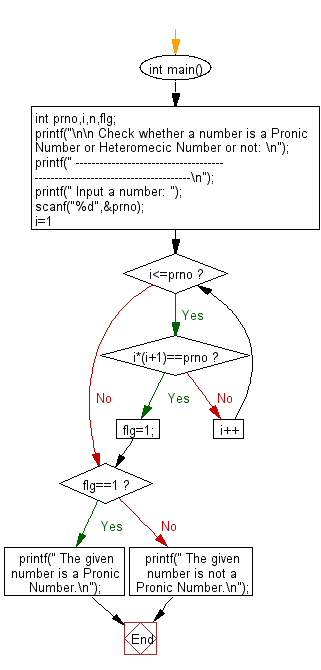C Exercises: Check whether a number is a Pronic Number or Heteromecic Number or not
C Numbers: Exercise-19 with Solution
Write a program in C to check whether a number is a Pronic Number or Heteromecic Number or not.
Test DataInput a number: 132
Sample Solution:
C Code:
# include <stdio.h>
# include <stdlib.h>
int main()
{
int prno,i,n,flg;
printf("\n\n Check whether a number is a Pronic Number or Heteromecic Number or not: \n");
printf(" ----------------------------------------------------------------------------\n");
printf(" Input a number: ");
scanf("%d",&prno);
for(i=1;i<=prno;i++)
{
if(i*(i+1)==prno)
{
flg=1;
break;
}
}
if(flg==1)
{
printf(" The given number is a Pronic Number.\n");
}
else
{
printf(" The given number is not a Pronic Number.\n");
}
}
Sample Output:
Input a number: 132 The given number is a Pronic Number.
Pictorial Presentation:
Flowchart:

-->
C Programming Code Editor:
Contribute your code and comments through Disqus.
Previous: Write a program in C to find Harshad Number between 1 to 100.
Next: Write a program in C to find Pronic Number between 1 to 1000.
What is the difficulty level of this exercise?
Test your Programming skills with w3resource's quiz.
C Programming: Tips of the Day
Static variable inside of a function in C
The scope of variable is where the variable name can be seen. Here, x is visible only inside function foo().
The lifetime of a variable is the period over which it exists. If x were defined without the keyword static, the lifetime would be from the entry into foo() to the return from foo(); so it would be re-initialized to 5 on every call.
The keyword static acts to extend the lifetime of a variable to the lifetime of the programme; e.g. initialization occurs once and once only and then the variable retains its value - whatever it has come to be - over all future calls to foo().
Ref : https://bit.ly/3fOq7XP
- New Content published on w3resource:
- HTML-CSS Practical: Exercises, Practice, Solution
- Java Regular Expression: Exercises, Practice, Solution
- Scala Programming Exercises, Practice, Solution
- Python Itertools exercises
- Python Numpy exercises
- Python GeoPy Package exercises
- Python Pandas exercises
- Python nltk exercises
- Python BeautifulSoup exercises
- Form Template
- Composer - PHP Package Manager
- PHPUnit - PHP Testing
- Laravel - PHP Framework
- Angular - JavaScript Framework
- Vue - JavaScript Framework
- Jest - JavaScript Testing Framework
